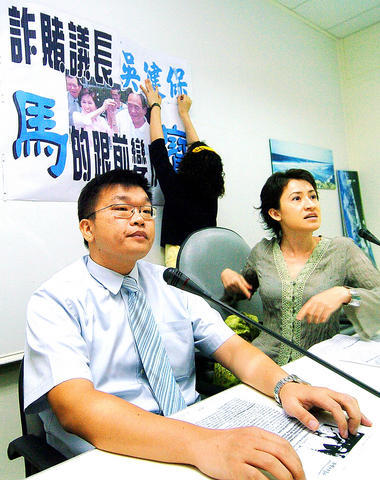Chinese Nationalist Party (KMT) Legislator John Chiang (蔣孝嚴) said yesterday he would advise KMT presidential candidate Ma Ying-jeou (馬英九) against spending large amounts of money on diplomacy if Ma were elected president.
"The problem of Taiwan's diplomatic predicament doesn't lie in Central and Southern America; it hinges on cross-strait relations," Chiang said.
Chiang has been arguing that only smooth cross-strait relations can prevent recurrences of incidents where the nation's diplomatic allies use the threat to switch diplomatic recognition from Taiwan to China as a bargaining chip when negotiating aid payments.

PHOTO: CHEN TSE-MING, TAIPEI TIMES
Representing the party caucus, the former foreign affairs minister held a press conference to respond to remarks President Chen Shui-bian (陳水扁) made in El Salvador on Sunday in defense of his foreign aid projects -- projects that have been criticized by his opponents as "dollar diplomacy."
The criticism came after a proposal made by Chen to include a clause in a joint communique signed by all the leaders at the summit showing the nation's Central American allies' support for Taiwan's efforts to join international organizations was rejected and omitted.
At a press conference, Chen asked the public not to apply double standards to his administration's foreign policy and that of the former KMT government.
Chen said that diplomacy is a loss-making business no matter who is in power and described as "ridiculous" the idea that countries receiving aid from Taiwan should repay it by endorsing the nation's bid to join the UN.
Chiang said the label "dollar diplomacy" had been used by the Democratic Progressive Party (DPP) to slander the former KMT government.
"In the past the KMT actually gained allies for very little cost. For example, the KMT set up an embassy in Latvia and that cost less than US$2 million, one-tenth of the foreign aid spent during this trip," Chiang said.
Chiang said the failure to get the clause included in the communique was an "unprecedented setback" for Taiwan, especially after Chen had spent a large sum of money.
In El Salvador, the president cited Macedonia as an example that illustrates the nation's diplomatic predicament, saying the KMT spent more than US$150 million securing those ties, even though they lasted for just two years.
Chiang said Macedonia was not something that could be compared with the money Chen had spent in Central America.
"Establishing diplomatic ties with Macedonia was an attempt to set up a beachhead in Europe, which is a diplomatic desert for Taiwan. That is very different from the way in which Chen has squandered money to consolidate existing diplomatic ties in Central and Southern America," Chiang said.
In response, Democratic Progressive Party (DPP) legislators Hsiao Bi-khim (蕭美琴) and Tsai Chi-chang (蔡其昌) defended the president's foreign aid policy.
"It is an international norm for developed countries to offer foreign aid to developing countries," Hsiao said when asked for comment. "Offering foreign aid is a global responsibility and also lives up to the expectations of international society."
Hsiao said she hoped Taiwanese would not get a false impression about the scale of foreign aid the nation provides because it only accounts for approximately 0.11 percent of the nation's GDP, which is less than the aid given by members of the Organization for Economic Cooperation and Development.
Tsai said the DPP is seeking to develop a different "model of diplomatic work, including economic development and substantial exchange and cooperation projects to replace the KMT's checkbook diplomacy" in the face of a more difficulties.
Additional reporting by Flora Wang

Taiwan is to commence mass production of the Tien Kung (天弓, “Sky Bow”) III, IV and V missiles by the second quarter of this year if the legislature approves the government’s NT$1.25 trillion (US$39.78 billion) special defense budget, an official said yesterday. Commenting on condition of anonymity, a defense official with knowledge of the matter said that the advanced systems are expected to provide crucial capabilities against ballistic and cruise missiles for the proposed “T-Dome,” an advanced, multi-layered air defense network. The Tien Kung III is an air defense missile with a maximum interception altitude of 35km. The Tien Kung IV and V

The disruption of 941 flights in and out of Taiwan due to China’s large-scale military exercises was no accident, but rather the result of a “quasi-blockade” used to simulate creating the air and sea routes needed for an amphibious landing, a military expert said. The disruptions occurred on Tuesday and lasted about 10 hours as China conducted live-fire drills in the Taiwan Strait. The Civil Aviation Administration (CAA) said the exercises affected 857 international flights and 84 domestic flights, affecting more than 100,000 travelers. Su Tzu-yun (蘇紫雲), a research fellow at the government-sponsored Institute for National Defense and Security Research, said the air

A strong continental cold air mass is to bring pollutants to Taiwan from tomorrow, the Ministry of Environment said today, as it issued an “orange” air quality alert for most of the country. All of Taiwan except for Hualien and Taitung counties is to be under an “orange” air quality alert tomorrow, indicating air quality that is unhealthy for sensitive groups. In China, areas from Shandong to Shanghai have been enveloped in haze since Saturday, the ministry said in a news release. Yesterday, hourly concentrations of PM2.5 in these areas ranged from 65 to 160 micrograms per cubic meter (mg/m³), and pollutants were

Taiwan’s armed forces have established response protocols for a wide range of sudden contingencies, including the “Wan Chun Plan” to protect the head of state, the Ministry of Defense (MND) said today. After US President Donald Trump on Saturday launched a series of airstrikes in Venezuela and kidnapped Venezuelan President Nicolas Maduro, concerns have been raised as to whether China would launch a similar “decapitation strike” on Taiwan. The armed forces regularly coordinate with relevant agencies and practice drills to ensure preparedness for a wide range of scenarios, Vice Minister of National Defense Hsu Szu-chien (徐斯儉) told reporters before a